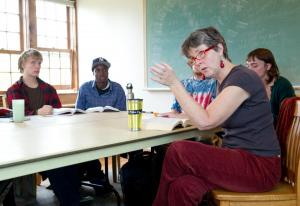Semester intensive reframes addiction debate
 “With the recent spike in heroin overdoses in rural white America, addiction is getting a lot of attention,” says politics professor Meg Mott. “Governor Shumlin made it the sole concern of his 2014 State of the State Address. I thought it would be a good time to step back from the debate and look at how the speeches and campaigns were being framed.”
“With the recent spike in heroin overdoses in rural white America, addiction is getting a lot of attention,” says politics professor Meg Mott. “Governor Shumlin made it the sole concern of his 2014 State of the State Address. I thought it would be a good time to step back from the debate and look at how the speeches and campaigns were being framed.”
The result is Speech Matters, a new semester intensive launched by Meg this fall, which uses the humanities to delve deeply into and reframe a national issue, in this case addiction. Following the full-on, focused model pioneered by Movies from Marlboro, Speech Matters is taking one group of students through the political, economic, cultural, and racial aspects of addiction in America. In the process, each student is learning to communicate their ideas in nuanced but compelling ways and building a professional portfolio of blog posts, podcasts, op-eds, and other media content.
“The questions being posed in the current debate tend to ignore the larger structural reasons for drug use: in a town with no jobs, selling drugs is far more lucrative than panhandling,” says Meg. “In a nation with reduced social services, using drugs dulls the pain of losing custody of one’s child, not getting a callback on a job interview, or having to wait through the winter for a Section 8 voucher. By focusing on the ‘addict,’ we don’t look at the bad decisions made by policy makers, who often seem to be ruled by corporate interests.”
 Meg draws inspiration for the Speech Matters program from her grandfather Archibald MacLeish, a librarian of congress, assistant secretary of state, and Pulitzer Prize–winning poet, who put as much emphasis on how things were said as on what was being said. “Archie spent enough time working for the government to know how speech could humanize or dehumanize a part of the population,” she says. “He got poet Ezra Pound out of St. Elizabeth’s mental hospital by arguing for the poet against claims that Pound was no more than a ‘crazy fascist.’”
Meg draws inspiration for the Speech Matters program from her grandfather Archibald MacLeish, a librarian of congress, assistant secretary of state, and Pulitzer Prize–winning poet, who put as much emphasis on how things were said as on what was being said. “Archie spent enough time working for the government to know how speech could humanize or dehumanize a part of the population,” she says. “He got poet Ezra Pound out of St. Elizabeth’s mental hospital by arguing for the poet against claims that Pound was no more than a ‘crazy fascist.’”
Students in Speech Matters will consider what it would look like to reframe addiction in human terms. “Instead of talking about people who use drugs as if they are deviant or different,” explains Meg, “critical theory asks us to consider who benefits from the creation of a class of ‘addicts.’” By investigating the history of drug policy and the cultural values embedded in the rhetoric of prevention, recovery, and treatment, Meg anticipates that more humanistic discussions of drug use will emerge.
“The most exciting thing for me is that we’ll be applying the skills of the humanities to an emerging political situation,” says Meg. “Right now, the 12-step programs are under scrutiny because of the Affordable Care Act, and ‘Big Pharma’ is moving in to support medication-assisted treatments. This is a very exciting time to think critically about who benefits from the existing narrative about addiction and what new, more community-based narratives might emerge.”